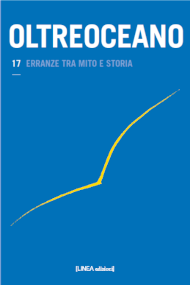Sostener un mito. Malabares en el fin del mundo
Keywords:
mito, historia, literatura argentinaAbstract
Un analista político comentó que la Argentina se esfuerza para sostener el mito argentino. Oportuna afirmación para reflexionar sobre un tema cuyas respuestas son tentativas. Un marco histórico y las aristas de ficción auxilian para desbrozar la relación entre Mito / Historia / Ficción aunque las nociones se retroalimentan hasta desdibujar sus límites.
Supporting a Myth. Juggling the End of the World
A political analyst commented that Argentina strives to support the Argentine myth: a timely statement to reflect on a topic whose answers are tentative. The allusions to fiction within an historical framework help to clear the relationship between Myth / History / Fiction although the notions are stretched until their limits are blurred.
Sostenere un mito. Destreggiarsi tra la fine del mondo
Un analista politico ha affermato che l’Argentina si sforza di sostenere il mito argentino. Tale dichiarazione è un punto di partenza per riflettere su un argomento le cui risposte sono provvisorie. Il contesto storico e gli spunti della finzione aiutano a chiarire la relazione tra Mito / Storia / Fiction, sebbene le nozioni siano rimandate fino a offuscarne i limiti.
Downloads
References
Alberdi, J. B. (1906): Peregrinación de Luz del Día. Viajes o aventuras de la verdad en el Nuevo Mundo. Buenos Aires: A.
Alfieri, M. (01/06/2020): Entrevista a Domingo F. Cavallo. “Me gustaba más el anterior Alberto Fernández. La nación.com.ar. Recuperado de https://youtu.be/niTtJEDCC6w
Barthes, R. (2003): El Placer del texto y La lección inaugural. Trad. de N. Rosa. Buenos Aires: Siglo XXI.
Batistella, M., Le Pera, A. & Gardel, C.: Melodía de Arraval. Recuperado de google.com/search?q=https%3A%2F%2Fwww.lyricfind.com+melodia+del+arrabal&oq=https%3A%2F%2Fwww. lyricfind.com+melodia+del+arrabal&aqs=chrome..69i57j69i58.10551j0j4&-sourceid=chrome&ie=UTF-8
Blengino, V. (1990): Más allá del Océano. Un proyecto de identidad: Los italianos en la Argentina. Buenos Aires: Centro editor de América latina.
Cocaro, N. (1970): Entrevista a Jorge Luis Borges, Lo importante no son las experiencias. La Nación. Recuperado de http://www.lanacion.com.ar/cultura/jorge-luis-borges-lo-importante-no-sonlas-experiencias-sino-lo-que-uno-hace-con-ellas-nid2365346
Duhalde, E. (2020): Estamos condenados al éxito. Recuperado de https: //www.lavoz.com.ar
García-Pelayo y Gross, R. (1977): Pequeño Larousse ilustrado. México: Larousse.
Martínez Estrada, E. (1974): Radiografía de la Pampa. Buenos Aires: Losada.
Sarlo, B. (1988): Una modernidad periférica. Buenos Aires 1920-1930. Buenos Aires: Siglo XXI.
Romero, L. A. (1994): Breve historia contemporánea de la Argentina. Buenos Aires: Fondo de Cultura Económica.
Sánchez, F. (1903): M’hijo el doctor. Recuperado de http://www.cervantesvirtual.com/portales/florencio_sanchez/imagenes_teatro/imagen/imagenes_teatro_04_florencio_sanchez_mhijo_el_dotor_programa/
Taviani, P. &Taviani, V. (1984): Kaos. Italia: G. De Negri.
Tizón, H. (1995): Luz de las crueles provincias. Buenos Aires: Alfaguara.
Zuleta I. (2019): Conversaciones con Nicolás Winazki. TN central. Todo Noticias, TV Argentina. Buenos Aires.
Downloads
Published
How to Cite
Issue
Section
License

This work is licensed under a Creative Commons Attribution-NonCommercial-ShareAlike 4.0 International License.
The authors undertake to comply with the following conditions, which are considered accepted at the time of submission of their contributions.
The sending of a text implies that it is unpublished and not submitted to be published elsewhere.
1. If accepted, the author shall confer on the publisher the right to publish and distribute it both in paper form and in the online electronic edition. The published articles will be downloadable and made available in open access.
2. Provided that it correctly indicates that the first publication took place in the journal Oltreoceano. Rivista sulle migrazioni the author has the right to: a) reproduce the article in separate extracts or collected in a volume; b) publish the article on their personal website or teaching site provided that these sites are of a non-commercial nature; c) deposit the article in online archives of a non-commercial nature, linked to the institution they belong to or as part of projects for the non-commercial dissemination and open access of scientific works.
The use of contributions by third parties, for commercial or otherwise unauthorized purposes, is not allowed. The publisher declines all responsibility for the unauthorized use of the material published in the journal.












